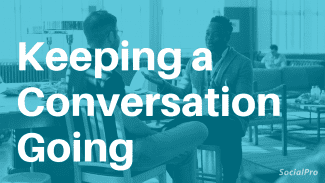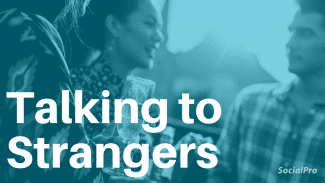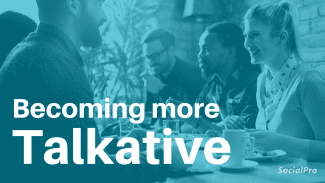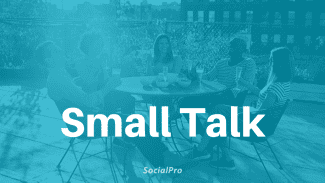“Sometimes when I’m talking to someone, I just freeze. I lose track of the conversation, my mind goes blank and I have no idea what to say. I either end up rambling or I just end the conversation, worried that I will say something stupid. Why does this happen to me and what can I do about it?”
If you’ve had this frustrating experience, social anxiety is probably the culprit, causing you to become nervous, insecure, and embarrassed. While this can be an indication of social anxiety disorder, a chronic but treatable condition, periodic social anxiety is something almost everyone struggles with. Because of the universal desire for acceptance, everyone worries about being judged, rejected, or embarrassed.
Still, without strategies to counteract social anxiety, it can become problematic. After freezing up, you might become highly self-conscious and find that your conversations become more forced and awkward, feeding into your anxiety and creating a vicious cycle. Thankfully, there are many simple, practical ways to interrupt this cycle, allowing you to actually enjoy social interactions, instead of dreading them.
What happens when your mind goes blank?
When your mind goes blank, you are experiencing a mild form of dissociation, a term psychologists use to describe disconnecting from your thoughts, feelings or current experience.
When you dissociate, you might feel empty, blank, numb, spaced out, or detached. When you dissociate, you can lose track of what’s going on around you, what you’re doing, and anything that is being said to you.
Dissociation is a natural defense mechanism your mind uses to protect you from painful or uncomfortable experiences. When you feel awkward, nervous or uncomfortable in a conversation, this can trigger your defenses, causing you to dissociate. The good news is that simple strategies like mindfulness and refocusing can help you stay focused and engaged, rather than disconnecting.
Look for patterns when you dissociate
Your social anxiety may pop up in the worst possible times, like during job interviews, presentations, first dates and other high-stakes conversations, forming a somewhat predictable pattern. For example, you might be more likely to blank out when you are put on the spot, meeting someone new, or when you’re feeling insecure.
Many people get more anxious in conversations with:[1]
- A group of people rather than just 1:1 (like giving a presentation)
- People in positions of authority (like a boss or judge)
- High stakes (like in a job interview)
- Those they believe will oppose them (a debate or new work proposal)
- Highly emotional topics (like asking someone out or during a conflict)
- Topics or people who trigger personal insecurities (like highly successful people)
Knowing when and where your anxiety is most likely to show up can prevent you from being caught off guard by anxiety, as well as helping you be more prepared to cope. Depending on the situation, there may be certain skills and strategies that are more helpful to you.
What to do when your mind goes blank in a conversation
There are several things you can do when your mind goes blank during a conversation. Some of these skills are designed to help you relax, calm down, and de-escalate the surge of anxiety you feel. Others teach you ways to refocus your attention away from anxious and self-conscious thoughts, instead helping you be more present. Topics, questions, and conversation starters are also outlined to help unclog communication barriers, letting conversations flow more naturally.
The next time your mind goes blank in a conversation, try one of the following strategies:
1. Reframe your nervousness as excitement
Chemically speaking, nervousness and excitement are almost identical. Both involve the release of adrenaline and cortisol into the bloodstream, activating your nervous system, increasing your heart rate, and providing a rush of energy. The next time you feel nervous before or during a conversation, renaming the feeling as excitement can help you become more tolerant and accepting of the emotion, making it easier to cope with it.[2]
This simple change in your mindset will help you imagine more positive outcomes of the conversation, rather than just imagining the worst-case scenario. For example, instead of focusing on the possibility of being rejected on a first date or job interview, try to focus on the exciting prospect of starting a new relationship or job. This simple strategy is drawn from Cognitive Behavioral Therapy, which is the most effective treatment for anxiety.[3]
We recommend BetterHelp for online therapy, since they offer unlimited messaging and a weekly session, and are cheaper than going to a therapist's office.
Their plans start at $64 per week. If you use this link, you get 20% off your first month at BetterHelp + a $50 coupon valid for any SocialSelf course: Click here to learn more about BetterHelp.
(To receive your $50 SocialSelf coupon, sign up with our link. Then, email BetterHelp’s order confirmation to us to receive your personal code. You can use this code for any of our courses.)
2. Identify the “goal” of the conversation ahead of time
All conversations have some “point” or “goal”. Identifying your goal ahead of time can help you clarify what you hope or want to happen in the conversation, while also giving you a compass that helps you make sure you’re on track. In professional settings, the goal might be to get a raise or a promotion or to vet an idea for a new project with a colleague or boss. In your personal life, the goal of conversations might be to meet like-minded people, develop friendships, or just get to know more about another person.
Even passing conversations with cashiers or customers waiting in line can have a goal of getting more comfortable with small talk, giving a compliment or saying “thank you” to brighten someone’s day. Goals are especially important in high-stakes conversations (like job interviews or serious talks with a significant other), but they can also help you stay focused in other, less serious conversations. When each conversation has a purpose, you’re less likely to get distracted by your own worries, insecurities, or inner monologues.[1]
3. Slow down and buy yourself time
When you get nervous, you might tend to rush through a conversation, talking faster in order to get it over with sooner. Rushing can make you more nervous and also makes it harder to keep up with your thoughts. Being intentional about slowing down and allowing natural pauses can buy you time, giving yourself time to collect your thoughts and find the right words.
Even explaining pauses by saying something like, “I’m thinking…” or, “I’m looking for the right way to explain this” can help feel less awkward about slowing down or pausing. This is especially important in conversations where you are presenting information, answering questions, or trying to get a specific point across.
4. Ask open-ended questions to get others talking
You probably feel more nervous when you are the one talking, so getting other people talking is one of the best ways to take pressure off of yourself. Because most people like talking about themselves, being curious can help you feel less anxious while also making a good impression. Good questions are essential tools for conversations, and very effective in-roads to start conversations, make friends, and get to know people.
In a conversation, asking open-ended questions like, “what are your thoughts on…” will help get people talking more than closed questions like, “do you think A or B” which tend to generate one-word answers. Open-ended questions are especially helpful to people who tend to ramble or go on long monologues when they are nervous, keeping conversations balanced.
Asking questions can help take the pressure off, but only asking questions can become an escape for some prone to social anxiety. They might avoid talking about themselves and as a result, don’t allow people to get to know them. So ask questions to take breaks from thinking about things to say, but occasionally share about yourself.
5. Warm up a conversation with a friendly exchange
Sometimes, taking time to warm up a conversation with some friendly small talk can go a long way towards helping you (and the other person) feel more comfortable. Take the time to ask a coworker about their family, a recent vacation they took, or what they did over the weekend. Also called icebreakers, these conversation warm-ups are multi-purpose, helping relieve anxiety while also building a sense of rapport.
Even in more formal conversations like a job interview or when meeting a new client, conversation warm-ups can be great ways to feel more comfortable with someone. The more comfortable you feel around them, the less you will worry about being judged, rejected, or saying the wrong thing, and the easier it is to just be yourself. In high-stakes conversations like job interviews or performance evaluations, these warm-ups can help set the tone for a more favorable outcome.
6. Check your assumptions
False assumptions about you or the other person might be making you more nervous while also setting conversations up to be uncomfortable. For example, assuming that someone isn’t interested in getting to know you or won’t like you stacks the odds against a friendly exchange, and assuming conversations will be awkward makes it more likely they will be. These assumptions can worsen anxiety, make you more self-conscious, and can create a self-fulfilling prophecy.[2, 4]
By forming new, more positive assumptions, you can set the stage for a more natural exchange. For example, try starting with the assumption that other people want to know more about you and are interested in what you have to say. You could also remind yourself that many other people struggle with anxiety, personal insecurities, and also worry about what others think of them. These assumptions are not only more likely to be accurate, they can also reduce anxiety, improve confidence, and set the stage for a more comfortable interaction.[1, 2, 4]
7. Avoid becoming defensive
When people feel threatened, they often get defensive, shutting down, withdrawing, or even overcompensating by talking more or switching on a “persona” to avoid being vulnerable. Defensiveness can even show up in your body language, making you less approachable.[1] It doesn’t take much to activate defenses – an innocent question, differing opinion, or off-hand comment can activate the “fight or flight” regions in your brain, sensing a threat of being judged, exposed or rejected.[4]
The brain isn’t great at differentiating between real threats and imaginary ones, so it is up to you to identify “false alarms”. When you are triggered, stay open and curious about what the other person is saying, rather than shutting down.[1] Resist the urge to argue, snap, or interrupt and also avoid defensive gestures like crossing your arms, backing away, or avoiding eye contact. Instead, lean in, smile, and make eye contact. These all help you appear confident but still approachable, while also sending signals to your brain that the threat isn’t real.
8. Don’t mentally rehearse conversations before they happen
People who get nervous about talking to people sometimes mentally prepare and practice a script of what they will say in a conversation before it happens. While this helps in some situations (i.e. practicing a speech ahead of time), rehearsals can sometimes cause you to get more flustered, especially if a conversation isn’t going as planned. These “safety behaviors” tend to work against people, keeping them from developing natural confidence in their social skills.[4]
If you spend a lot of time rehearsing conversations before they happen, have a few unscripted conversations and see how they go. Even if they don’t go perfectly, these conversations can help build confidence, proving that you might not need to spend so much time preparing. If you find advance preparation helpful, use this article to identify topics or questions to get others talking, instead of scripting what you will say.
9. Enrich your life to have more to talk about
Sometimes, having your mind go blank during conversations is a byproduct of feeling like your life has become boring, stale or uninteresting, and changing up your routine helps address the root cause. By getting out more and trying new things, you can enrich your life while also meeting new people and getting better at starting conversations.
Seek out new interests or get more involved in a hobby, project or activity you enjoy. You could enroll in a virtual class, attend a meetup, or join a committee or other organization in your community. By enriching your life with new activities, you can meet people while also generating more stories, experiences and interests that become natural conversation starters.
10. Stop participating in inner dialogues
One of the reasons you might find it hard to focus during a conversation is because there is a separate conversation happening in your head.[2, 3] In your mind, you might be criticizing yourself for not knowing what to say or worrying what the other person is thinking. These inner dialogues keep you distracted and focused on yourself, instead of on the conversation.
While you can’t control what thoughts pop into your mind, you can choose how much you participate by repeating, ruminating, or even debating them. Getting out of your head can be as simple as becoming more involved in your conversation rather than your thoughts. Give the other person your undivided attention by training your focus on them, their story, or what they are saying. Each time your mind gets pulled back to your thoughts, gently bring your attention back to the present.[2]
Final tips for natural conversations
Keep trying the skills listed above until you find the ones that work best for you. Don’t get discouraged if you sometimes get nervous or tongue-tied. Instead of replaying these in your head, use humor and self-compassion to make light of them and most importantly, don’t give up. If the admission price for close and meaningful relationships included a few awkward, tense, or uncomfortable interactions, isn’t it worth it? Because it’s hard to be healthy, happy and fulfilled without having strong relationships, most people would agree it is.














Great points.